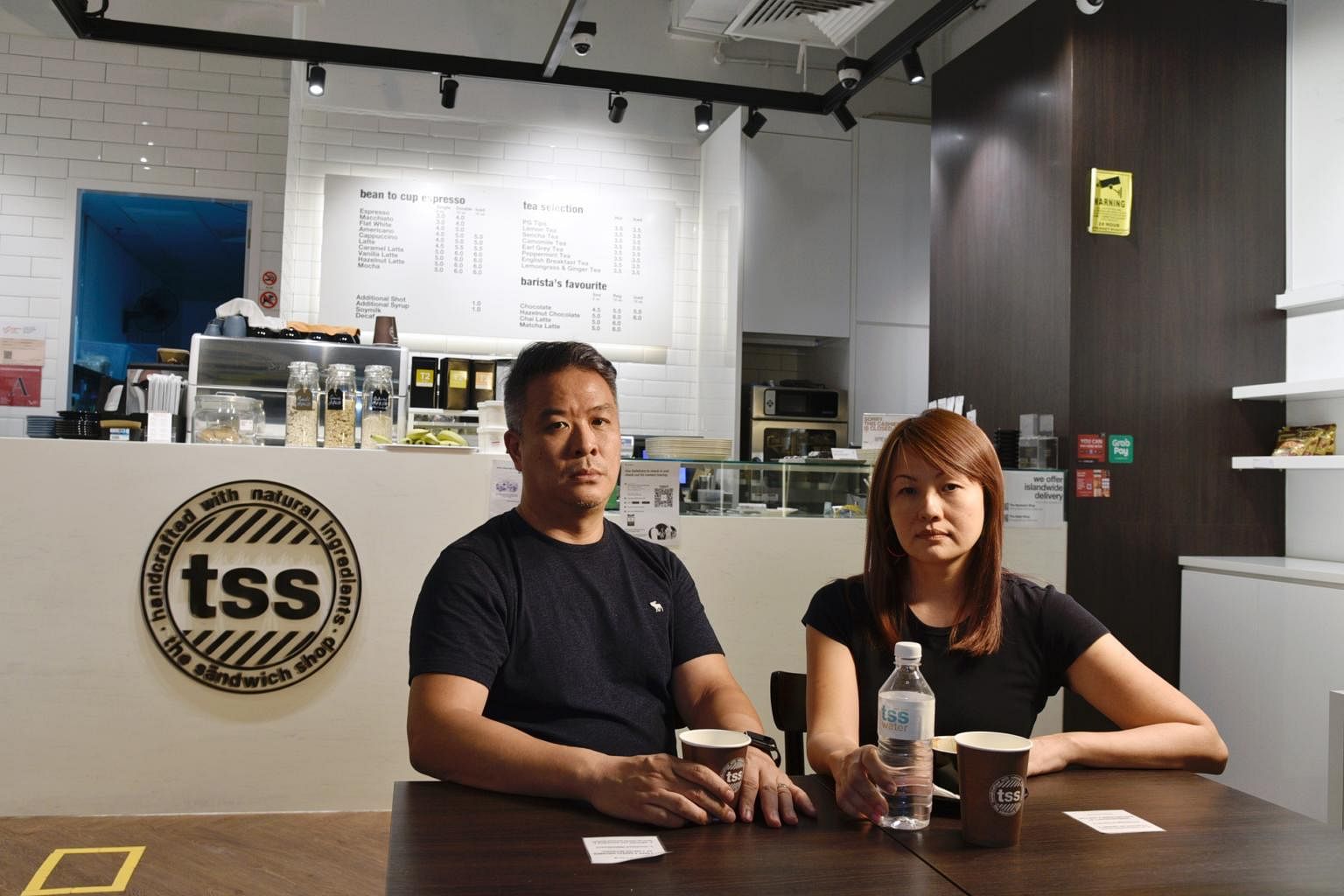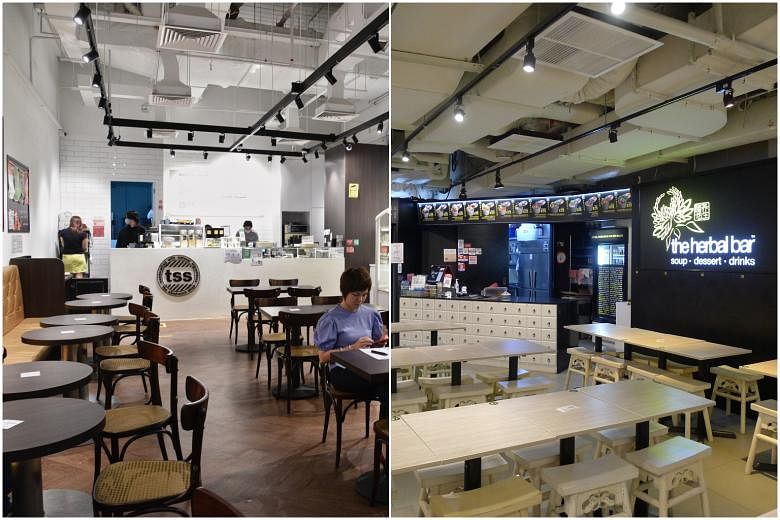SINGAPORE - Just seven months ago, you would have been lucky to get a seat at most of the food outlets in Raffles Place during lunch on a weekday.
Now, you see more empty seats than people.
While eateries in other areas are once again filling up with the gradual reopening of the economy, those in the Central Business District (CBD) are not seeing any light at the end of the tunnel.
This is because many workers in the area are still working from home.
Casual food and beverage outlets in the CBD tell The Sunday Times that business is still only a small fraction of what it used to be before the pandemic.
Most are located on the lower floors of office towers and, before the pandemic, catered to the throngs of workers out to grab a quick lunch.
While rental waivers and the Government's Job Support Scheme (JSS) have helped most of the eateries stay open these past few months, business owners are worried now that the assistance is being scaled back.
The scheme, which subsidises the salaries of local employees, has been extended to March next year, but the amount will be lowered to 30 per cent from 50 per cent previously.
Rental relief is also expected to be cut back progressively. Rental is a major concern as it can start at $15,000 a month for a 1,000-sq ft space in the Raffles Place area.
Mr David Cheung, 50, is not expecting things to get better any time soon. He and his wife, Ms Denmy Lam, 47, own The Sandwich Shop chain, which has outlets in the CBD and business parks, as well as The Salad Shop.
They used to have 10 outlets, but closed two sandwich branches and a salad shop last month.

Their first Sandwich Shop outlet in Robinson Road, which opened 18 years ago, is also closing this week because the lease is up. This leaves the couple with five Sandwich Shop outlets and one Salad Shop.
Mr Cheung says when they reopened the outlets after the circuit breaker in June, business for the first few weeks was down by 90 per cent, compared with before the pandemic. In the past two weeks, it has picked up by about 10 per cent.
He had about 100 employees - about 70 are Singaporean - at the beginning of the year. But only 25 will be left by the end of this month, as almost all his foreign staff have been laid off in the last two months.
He says: "I'm getting desperate, but there is nothing much I can do. Ours is a grab-and-go concept that needs volume.
"And even though some companies are getting their staff to return to the office this month, I haven't seen much improvement in my business. Our food appeals to expatriates, many of whom are still working from home."
He tried working with delivery platforms, but found the take-up rate to be dismal.
"Ours is just not one of those delivery foods you would order, because a sandwich is something you can make at home," he says. "People working from home would eat something they can get in their neighbourhood."
He says it is not easy for them to pivot to a different concept either: "We can't suddenly switch to serving bistro food because we are not equipped to do that. Besides, we're called The Sandwich Shop, so we can't justify serving spaghetti or fried rice."
Ms Lam adds that they are focusing on how to get out of their leases without forfeiting their deposits - moreover, they had renewed the lease of their biggest outlet at Income @ Raffles only recently.
Their main hope, the couple say, lies in people going back to work in the CBD, though they acknowledge it will likely not happen soon.
In the meantime, they hope rental relief can be structured according to location, so that CBD eateries get more assistance than those in areas where business has picked up.
Rental costs are also weighing on the mind of Mr Mark Ng, 38, who owns 16 shops including coffee chain Local Coffee People, The Wolf rice-bowl and coffee chain, and Saigon Rolls, which sells Vietnamese rolls, salads and sandwiches.
He opened all his outlets in the CBD as he felt it would be easier to attract staff, since they open only five days a week.
But his business plummeted by 95 per cent when the pandemic worsened in Singapore in March and has since recovered by only about 20 to 30 per cent.
He closed one coffee outlet last month and has not been paying rent since March, even though his rental waiver was only from April to July, as mandated by the Government. He has been ignoring reminders from his landlords.
"But I have to pay eventually," he adds. "Some landlords have been understanding, but others refused to meet me to work it out."
Mr Ng, who started his business 11 years ago selling just coffee and tea, now has about 30 employees - down from more than 80 before. Many left on their own, he says.
Another F&B owner who has been defaulting on rent payments is Mr Waye Tan, 39, who runs The Herbal Bar, which sells traditional Chinese herbal soups at the basement of Republic Plaza.
He says he has not paid his landlord since April, even though he has been receiving invoices for servicing and miscellaneous charges.
Mr Tan's business partner, Mr Hugh Kwan, 45, says the tenants met and decided on the course of action together.
By relying on the JSS and by not paying rent, they are able to keep the business operational, he adds. "But if we pay rent, we won't be able to pay salaries."
The Herbal Bar's business plunged by 90 per cent in March. The worst day was April 7, when the circuit breaker period started and the shop toted up only $60 in sales that day. It was a Tuesday - a work day.
Mr Tan says they used to sell up to 300 bowls of soup a day, but now consider themselves lucky to sell 50.
Business has not picked up with people returning to work in phase two, he notes, because most of them are younger workers who are not their main clientele. Their herbal soups appeal to an older crowd.
Delivery orders did not make up the difference either, even though they received some orders during the circuit breaker period when dine-in was not allowed - mostly from friends who wanted to support them.
Mr Tan has lost two of his five workers, both Malaysians. One returned home earlier and the other was let go last month after the owners found him a job with another eatery.
The partners are living each day as it comes.
Mr Kwan says: "We'll continue as long as we can. But if we're pushed to the wall, we will just have to close and forfeit our deposit with the landlord."












